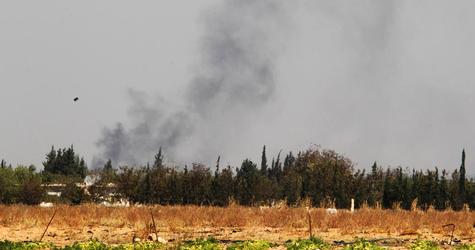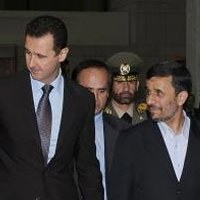![]()
Wed, Jan 30, 2013 | RubinReports | By Barry Rubin
Danger of deadly nerve gas or advanced anti-aircraft missiles in hands of terrorist organization.
Israeli planes attacked a store of advanced anti-aircraft missiles at a Syrian base that were about to be transferred to Hizballah. The attack came shortly after spotting a build-up of Hizballah and Syrian forces at the base.
During the 2006 Israel-Hizballah war, Israel frequently hit convoys delivering weapons to Lebanon the moment they crossed the Syria-Lebanon border, showing a very strong intelligence capacity on such events. This attack also shows both good intelligence and an ability to act on it.
The Israeli position has been that it will not allow any transfer of advanced weapons by the Syrian regime to either Hizballah or radical Lebanese Sunni groups. Israel had previously made this point clear through public statements to the Syrian government.
Syria has regularly transferred advanced weapons systems to Hizballah. But Israel has declared a “red line” in being ready to stop the shipment of chemical weapons or advanced Russian-made anti-aircraft missiles. The missiles would be used against Israeli reconnaissance planes watching Hizballah’s military build-up in the south and future arms transfers from Syria, as well as in the event of Israeli retaliation after Hizballah terrorist attacks into Israel.
Brigadier General Amnon Sofrin, a retired army intelligence officer and former head of intelligence for the Mossad, Israel’s intelligence agency, gave a press conference in which he pointed to the danger from any future transfers of Syrian chemical weapons to Hizballah.
“I think that if we have solid evidence shared by our own partners all over the world, that chemical warheads are being transferred from Syria to Lebanon, to Hezbollah, I think that no one will condemn Israel for trying to prevent it.”
This should be read as explaining that Israel notified the United States and others of its intelligence information prior to the attack.
He added that Syria possesses Sarin, a deadly nerve gas, and an even worse poison called VX which remains on the ground for many days after being fired. Syria has hundreds of warheads capable of carrying these substances. Hizballah could also put these warheads on missiles it possesses and shoot them into Israel.
Sofrin continued:
“Should [Syrian dictator Bashar al-]Assad decide his regime is at its end, he could think, ‘If I go [lose power part of my legacy] will be that Hezbollah will have capability to hit Israel very badly.’”
While much of the Syrian opposition is radical Islamist or even part of al-Qaida, Sofrin continued, that is a new threat but not an immediate threat like that emanating from Hizballah.
However, given the likelihood of the regime being overthrown and replaced by a government that is led by the Muslim Brotherhood and, either willingly or because it is unable to prevent them from doing so, gives a free hands to Salafist groups or even al-Qaida affiliates, Israel cannot predict what its security situation will be like with Syria a year from now.
Note that if al-Qaida gets its hands on chemical weapons — and that means deadly nerve gasses — this would be a direct threat to the United States and other Western countries as well as to Israel.
Barry Rubin is director of the Global Research in International Affairs (GLORIA) Center and editor of the Middle East Review of International Affairs (MERIA) Journal. His latest book, “Israel: An Introduction“, has just been published by Yale University Press. Other recent books include “The Israel-Arab Reader” (seventh edition), “The Long War for Freedom: The Arab Struggle for Democracy in the Middle East” (Wiley), and “The Truth About Syria” (Palgrave-Macmillan). The website of the GLORIA Center and of his blog, Rubin Reports. His original articles are published at PJMedia.



 RSS
RSS











Latest Comments
Hello Mike, Thank you for your positive feedback to the article. I felt there wasn’t too much critical analysis of ...
Thanks for this considered and well constructed article. A follow up article on the manner in which the editorial contro...
THE CLUELESSNESS OF CLAIMING THAT OBAMA'S MIDDLE EAST POLICIES WERE A FAILURE CANNOT BE FURTHER FROM THE TRUTH, WHAT THE...
As long as Obama is the president of the usa do not trust the us government......
Thank you for an good read....